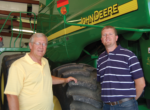Advertise Follow Us
Soil Health
Boron Key For Pollination, Flowering And Podset
To get full benefit of boron, plants need a continual soil supply — either naturally or supplemented through a fertilizer application — throughout the growing season.
Read More
Precision, Covers, Planter Tweaks Piece Together No-Till Success
Ohio no-tillers Steve and Doug Longfellow are saving inputs, improving soils and hiking yields on their heavy clay fields by building a complete no-till system.
Read More
Feeding Worms, Microbial ‘Livestock’ Transforms No-Till Fields
In hilly south-central Pennsylvania, Dave McLaughlin finds no-till, extensive cover cropping and manure application keys soil health success.
Read More








